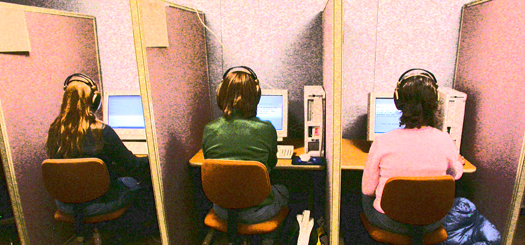Learning and Cognition Lab Facilities
The Learning and Cognition area operates several research laboratories. These laboratories are overseen by department faculty and are used by both students and faculty to explore theoretical and applied research questions.
The Laboratory for Learning and Cognition
Reading Laboratory
The Multimedia and Instructional Design (MIND) Lab
Zummo Lab
STEM Learning Lab
The Life Right Here and Everywhere Research Project
Ambitious and Equitable Teaching
The Laboratory for Learning and Cognition:
The Laboratory on Learning and Cognition is shared by the Learning Sciences faculty. The Laboratory features several IBM PC compatible data collection computers, as well as work space for graduate students and research assistants. Reaction time experiments are programmed using the E-Prime experimental authoring system. Research conducted in the Laboratory for Learning and Cognition has involved the acquisition of cognitive skills, undetected errors in cognitive skills, priming processes in memory, and the perception of frequency of events.

Reading Laboratory:
The Reading Laboratory is directed by Anne E. Cook and is located in the BUC building on campus. The Laboratory features an SMI Eyelink remote eye-tracker. Research conducted with the eyetracker has involved the psychology of reading, the psychology of writing, cognitive processes in autism, and the detection of deception.
![]()
The Multimedia and Instructional Design (MIND) Lab:
The MIND (Multimedia and Instructional Design) lab is directed by Kirsten Butcher and is located in the BUC building on campus. The MIND lab facilitates mixed-methods learning and usability research focused on educational technology. The MIND lab is designed to accommodate studies on individual learning and collaborative learning with technology and includes hardware (e.g., video cameras) and software (e.g., screen capture technology) that supports the collection and analysis of rich user data.
Zummo Lab:
Dr. Zummo’s research is conducted in both the Educational Psychology Department and the Natural History Museum of Utah. Research examines social, cultural, and cognitive influences on the learning process around controversial issues in science, such as climate change, and argues for greater attention to the political culture and identity of science learners. Drawing on sociocultural theory, as well as concepts from political psychology and communication, Dr. Zummo uses mixed methods to understand how people think, learn, and teach about science. Her research aims to support all people in using science to make sense of the world in their daily lives in ways that fit with their ideas of who they are.
STEM Learning Lab:
The STEM Learning Lab is run by Tracy Dobie, Lauren Barth-Cohen, and Lynne Zummo and
focuses on work at the intersection of the Learning Sciences and Mathematics and Science
Education research. Research within this group applies a range of theoretical perspectives
– including cognitive and sociocultural theories of learning – to investigate both
student and teacher learning and
engagement across grade levels in formal and informal learning environments. In recent
years, research conducted by this group has focused on improving elementary mathematics
and science methods classes through new tools and techniques to support pre-service
teacher learning. Research questions have explored learning and reasoning processes
in math and science contexts; engagement, power, and social dynamics in learning environments;
and issues of identity and culture in STEM learning. Collaboration with practicing
teachers and public schools is an important component of research conducted in this
group. Graduate students working within this group learn skills related to the collection
and analysis of qualitative and quantitative data in a variety of settings, along
with specialized training in qualitative and mixed methods analysis of video, audio,
text, and artifacts. The group is equipped with a range of data collection tools and
analysis software including video cameras and external microphones.
The Life Right Here and Everywhere Research Project:
This project is funded by NSF through 2024; the PI is Nancy Songer, who is also the
Associate Provost of STEM Education and the Director of the Usable STEM Research and
Practice Hub. Our world is challenged by environmental, educational, health, and economic
challenges with foundations in Science, Technology, Engineering, and Mathematics (STEM)
disciplines. To address these challenges, we cannot rely on individuals or even experts
within one area of science, technology, engineering, mathematics, or education. We
must innovate with, study, and empower students, teachers, community members, and
university and industry partners toward collective action. Our planet is home to 1.8
billion young people between 10 and 24, many of whom are increasingly motivated to
explore the design of solutions even if their formal schooling rarely provides learning
opportunities to innovate and design.
This project focuses on designing and evaluating middle and high school curricular resources where students join and become teams of scientists and engineers to generate solutions to local STEM challenges. Graduate student and postdoctoral work include curriculum design, teacher professional development, assessment design, learning technologies design, classroom-based and out-of-school quantitative and qualitative research studies, writing, and presenting at regional and national conferences.
Ambitious and Equitable Teaching:
This group is led by David Stroupe, who is also the Director of Research at the Usable STEM Research and Practice Hub. He has three overlapping areas of research interests anchored around ambitious and equitable teaching. First, he frames classrooms as science practice communities. Using lenses from Science, Technology, and Society (STS) and the History and Philosophy of Science (HPS), he examines how teachers and students disrupt epistemic injustice through the negotiation of power, knowledge, and epistemic agency. Second, he examines how beginning teachers learn from practice in and across their varied contexts. Third, he studies how teacher preparation programs can provide support and opportunities for beginning teachers to learn from practice.
